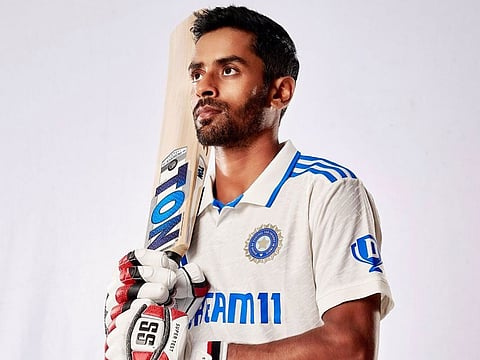India-England Test: Frustrated fathers bowl bouncers as sons take the hit in crowded cricket bench
Abhimanyu Easwaran’s father joins growing chorus of outspoken parents

Dubai: The outspokenness of Indian cricketers’ fathers is once again in the spotlight, and this time it’s Abhimanyu Easwaran’s father, Ranganathan Easwaran, who has aired his disappointment in public. As the Bengal opener continues his prolonged wait for a Test debut, despite being part of the Indian Test set-up for nearly three years, his father’s comments have added to a growing pattern: anxious, often outspoken, parents expressing frustration that may inadvertently pile more pressure on their sons.
Taking the short IPL route
Easwaran, 29, was part of the Indian squad for the Border-Gavaskar Trophy in Australia back in 2020—21 and has since been a familiar presence in the extended squads. Yet, 961 days and several tours later, he is still waiting for a cap.
His latest omission came in the fifth and final Test against England at The Oval, where India made four changes. Karun Nair, Dhruv Jurel, Prasidh Krishna, and Akash Deep were included, but Easwaran remained on the bench.
That proved to be the tipping point for his father, who voiced his dismay in an interview with TimesofIndia.com. “My son looks a little depressed, but that is bound to happen,” he said. “Some players jump the gun based on IPL performances which earn them a spot in the Test team. IPL performances should not be counted while selecting the team for the longest format. Ranji Trophy, Duleep Trophy, and Irani Trophy should be the basis for Test selection.”
Wading into the selection debate
It’s not the first time a parent has waded into the selection debate. Only last week, Washington Sundar’s father lashed out at the selectors and team management for overlooking his son, which M. Sundar subsequently clarified as taken out of context. Sanju Samson’s father has spoken out in the past, and even Ravichandran Ashwin’s father has questioned the handling of his son’s career. The trend, while emotionally understandable, raises an uncomfortable question: are such interventions helping or hurting?
Cricket is, after all, a team sport. Individual performances matter, but final selections depend on a complex set of factors — team balance, opposition, conditions, and long-term planning. In Easwaran’s case, he has had the misfortune of vying for an opening slot at a time when Rohit Sharma is firmly entrenched at the top and others like KL Rahul, Shubman Gill, and Yashasvi Jaiswal are jostling for the second spot.
Karun Nair's second chance after eight-year wait
Moreover, even players with international centuries — Ruturaj Gaikwad and Ishan Kishan — have found themselves pushed out of the reckoning due to sheer competition. Karun Nair, who was recently recalled, knows the pain of being in and out; he waited nearly eight years after scoring a triple century, only to be dropped again after a couple of failures. He returned for the fifth Test and made a crucial half-century — a reminder that opportunities are rare and resilience is critical.
Ranganathan Easwaran’s frustration is not without basis. According to him, Abhimanyu scored over 860 runs in domestic cricket over the past year, including consistent returns in red-ball tournaments. “What is the job of a player? It is to score runs. He has done that,” he said, arguing that players should be rewarded for performances in the domestic circuit, not just the IPL.
Still, the issue here isn’t whether Abhimanyu deserves a Test debut — many agree that he does. The concern is the precedent being set by turning selection debates into public family affairs. India, with its overflowing talent pool, will always have players who miss out despite deserving records.
Long list of heartbreaks
The likes of Padmakar Shivalkar and Rajinder Goel never played a Test. Leg-spinner V.V. Kumar took seven wickets on debut but ended with just two Tests. Jurel, from the current team is also going though such situation. The list is long, and the heartbreak real.
Yet, the challenge for today’s cricketers is not just competition but the added scrutiny brought on by those closest to them. Intentional or not, when fathers speak out, they shift the narrative and burden onto the player — something no athlete needs while chasing a dream already fraught with pressure.
As the Indian team builds toward a new cycle of Tests and World Championships, the message to families might be this: let the players speak with their bats — and allow the selectors to do their jobs without echoes from the gallery.
Sign up for the Daily Briefing
Get the latest news and updates straight to your inbox



